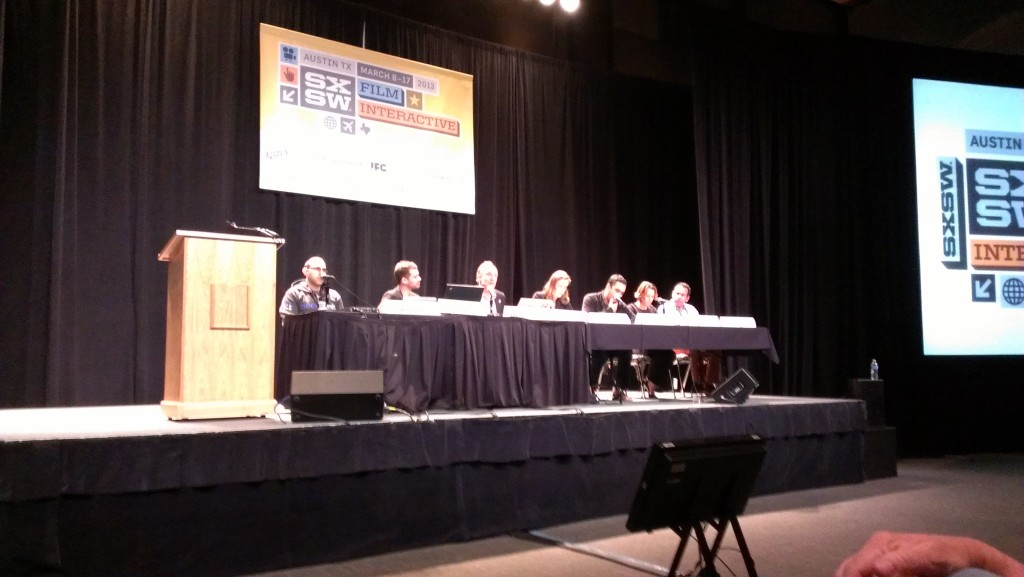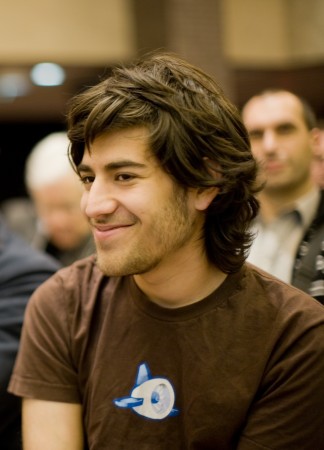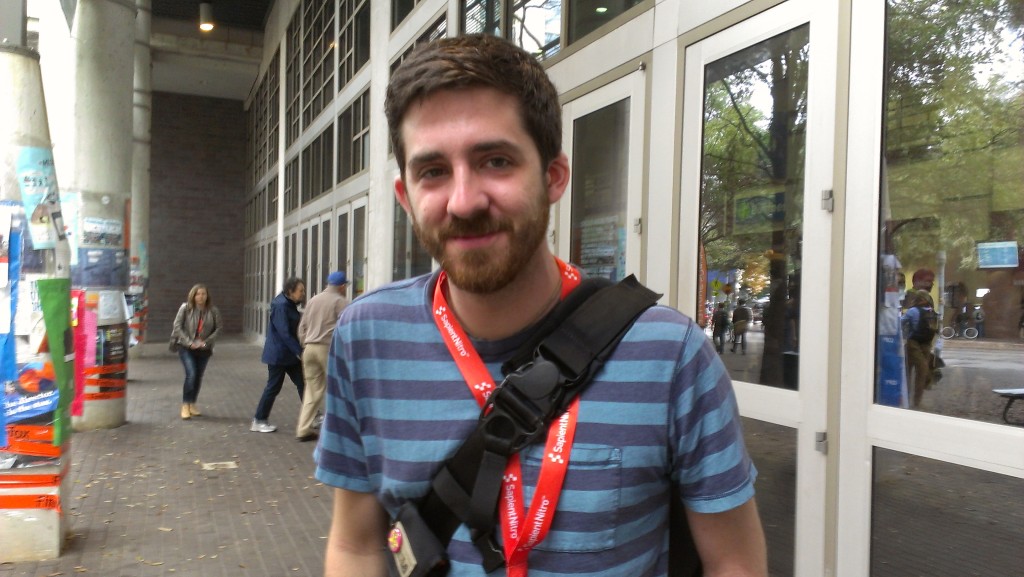Originally published on Firedoglake.
His death radicalized thousands of computer geeks, launched a worldwide campaign to reform computer fraud laws and the department of justice, and inspired an upcoming national day of action.
We won this fight because everyone made themselves the hero of the story. –Aaron Swartz on the battle against SOPA
On Friday night at South by Southwest Interactive, a panel of great minds — all of them touched in some way by Swartz — gathered to recount his legacy and look toward the future of his work. Organized by the Swartz-founded non-profit Demand Progress, the panel consisted of:
- Marvin Ammori, First Amendment lawyer
- Sir Tim Berners-Lee, inventor of the World Wide Web
- Gary DeGregorio, one of Swartz’s bosses at Thoughtworks
- Jennifer Lynch of the Electronic Frontier Foundation
- David Segal, executive director of Demand Progress
- @TarenSK, Swartz’s partner for the past year
- Tim Wu, Law professor at Columbia University
The panel opened with Aaron speaking in his own words in his famous speech about the defeat of SOPA, included at the top of this article. Swartz’s presence, and his absence, were felt throughout the evening.”I only wish tonight was about a defense campaign for Aaron and he was the one talking,” DeGregorio told me after the panel.
Sir Tim Berners-Lee: Do Like Aaron Did
Sir Tim Berners-Lee spoke of how the consequences have changed in modern times — the law now punishes us for thought and intent rather than harm. Yet it’s more important than ever to spend at least some of our time acting. “We lost one. If you’re wondering how to spend your time, do like Aaron did,” he told the audience.
Yet Berners-Lee, and later Swartz’s partner Taren, also urged us to balance activism with self-care. One of Swartz’s failings was that he tried to do everything without taking time for himself, and never reached out for help. None of his friends, not even Taren herself knew the inner details of his case or how much strain he was under until she found him after his suicide. The world would be a better place if we all spent a little time on activism, but Swartz himself seemed to dedicate his life to it to beyond the point of burnout.

Tim Wu: All of Us Felons
Columbia Law professor Tim Wu told us you can judge a society by how it treats its eccentrics, innovators and tricksters — and our society is failing the Swartz’s of the world. Wu reminded us that Steve Jobs and Steve Wozniak funded Apple by building phone phreaking equipment; the crimes they committed were far worse than those committed by Swartz. What if we’d persecuted them the way we had Aaron? The Computer Fraud and Abuse Act (CFAA) is so broad that it is a crime to violate a Terms of Service (TOS) agreement; it has become a felony to lie on an online dating site. It’s so broad, Wu said, that “everyone interesting in this room is a felon,” echoing his essay on Swartz for the New Yorker.
What was the point of the Revolutionary War, asked Wu, if we were going to just create a society where everyone is a criminal?
Jennifer Lynch: Inspired to Change the Law
Jennifer Lynch of the Electronic Frontier Foundation spoke about how their organization is inspired by Aaron’s legacy. They are lobbying to pass Aaron’s Law. Aaron’s Law would reform the CFAA by preventing it from being a crime to violate an online contract, especially one you are forced to sign like a TOS agreement. Secondly, it would change the law so it is no longer a crime to legitimately access data but to do so in a unanticipated way (such as Aaron’s act of mass-downloading academic papers via JSTOR). Finally, it would keep hackers responsible for victimless acts from being charged with more than a misdemeanor. The EFF is also working to open up access to taxpayer funded academic research, like the bulk of the articles Swartz downloaded from JSTOR at MIT.
Lynch urged us all to contact our congresspeople and ask them to support Aaron’s Law.
Marvin Ammori: Prosecuting Free Thinkers Not Bankers
When Ammori first met Swartz, they didn’t get along. Ammori was excited about Obama’s election, and believed many of his cabinet appointments would do better in the world. Swartz argued with him, saying he’d met some of those people and considered them creeps and corrupt. Of course, Swartz was right in the end.
Ammori said we should all do as Aaron suggested — when prioritizing our tasks, we should do the most important thing first — the most important thing for the whole world. He questioned why we go after people like Aaron Swartz yet let the real criminals — such as bankers — go free. The Swartz case is not just about a single overzealous prosecutor, but about the widening gap between justice and the law. He stressed that we can’t solve any of our big problems — war, the environment — without free speech and the right to organize. These are “foundational issues” on which the rest depend.
Gary DeGregorio: Aaron the Human

Aaron’s boss, Gary DeGregorio of Thoughtworks, spent his portion of the panel humanizing our lost hero. He talked of Swartz’s genial teasing about DeGregorio’s obsession with Twitter, or singing Muppets songs with his team. Aaron pushed Thoughtworks to do more good in the world, and says his example is still pushing them and other corporations to go further. One of Swartz’s major projects is the open-source Victory Kit, a tool which would allow new activists to launch compelling online campaigns without the need for using the infrastructure of groups like MoveOn or Change.org. It would also allow activists to build on each other’s campaigns, using them as models to build on later — for example, creating a customized version of a successful local action campaign in a new city. The model of activism in Cory Doctorow’s Homeland is based on similar ideas from Swartz.
Be like Aaron, don’t be ordinary. –Gary DeGregorio
@TarenSK: A Call to Rise Up
Taren’s talk was the most stirring of the entire panel. She called out academics, developers, the mainstream media for their complacency. MIT could have demanded the case be dropped, and never did. Given the abuse of academic freedom the case repesents, she asked why have academics not risen up en masse? The mainstream media refuses to look deeper into the case than the surface — they may suggest Aaron’s charges were too high, but none ever question whether what Aaron did should even be considered a crime!
“There’s deep shame in believing you want to change the world instead of actually changing the world,” she told the audience. “Are you self-critical enough?” she asked. There is no shame in failure, only being too prideful to look at your own work and question your success.
If you can’t name your failures, you’re either lying to yourself or you’re not aiming high enough.
“We ought to live in a country where you’re innocent until proven guilty and you’re able to prove your innocence,” she said. Instead, the Department of Justice routinely throws the book at defendents, threatening perpetrators of even victimless crimes with the highest charges possible. Threatened with the loss of decades of life to prison, they take plea bargains instead. Swartz, she reminded us, was one of the most privileged victims of the prison-industrial complex. We can’t just fight for rich white guys, but for everyone, if we’re to see a truly just justice system.
Radicalizing the Geeks: The Future of Aaron’s Legacy
here’s a moment of possibility in many mass movements, from the Wisconsin Uprising to Occupy Wall Street. In that moment, activists drawn by a single issue (like corporate money in politics) realize that the problems go far deeper. Citizens United is a symptom of the corporate takeover of the United States. The Tar Sands blockade is linked not just to the climate crisis, but to issues of class and race. Scott Walker’s crackdown on unions is part of an international conspiracy by the 1% to destroy workers’ rights.

Online activism is in such a moment. Swartz’s death reframes the discussion beyond the battle against the over reach of US Attorney Carmen Ortiz or even just reform of a single law. Activists are taking to the streets spontaneously, but even more so, privileged, protected geeks are thinking about the broken criminal justice system for the first time, and beginning to stand up for themselves and for us all. Rather than simply fighting bad laws like SOPA/PIPA, activists are realizing that now is the time to protect the Internet by lobbying to pass good laws as well, by pushing for larger societal change to bring our dinosaur institutions into the modern age. They’re realizing that all our grievances are connected.
I spoke for a few minutes today with Charlie Furman, an organizer with Demand Progress. Swartz hired Furman to lead a Boston-based campaign to pressure MIT to make a public statement against Swartz’s prosecution. He was also preparing to begin fundraising on Aaron’s behalf, but said Swartz hated asking for money even though the case had destroyed the considerable fortune he’d made from the sale of Reddit. After Aaron’s death, Furman began organizing toward a national day for computer fraud law reform. Demand Progress hopes this will happen sometime in the next three months.
Furman said they saw the SXSW Town Hall as a chance to reach a new audience. “Even though we’ve had events all over the place, many people are just now realizing the depths of the story.” Furman thinks it’s very likely Aaron would have been found not guilty if his case had gone to trial.
He told me the upcoming day of action is an opportunity to build on the work against SOPA & PIPA, but with a more human face. Unlike the largely anonymous (and Anonymous) work of most online activists, he believes the loss of Swartz gives many a personal stake in fighting for justice.
The seeds of Aaron’s legacy are still sprouting.
Below: